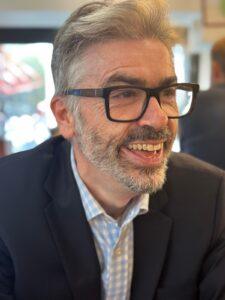This year’s theme emphasises positive role models and the need to address issues such as mental health stigma, health inequalities, and the pressure of traditional gender roles. It’s an opportunity to remind men that prioritising their health is not a sign of weakness but of strength.
We are honoured to share the inspiring story of our colleague, Donal Markey, Pharmacist and Assistant Director of Programmes, who bravely reflects on his cancer journey and urges all men to take charge of their health.
Donal Markey’s Story
Can you tell us about your health journey?
I have been a cancer patient since January 2023, diagnosed with throat cancer, and was treated at Churchill Hospital, Oxford Radcliffe NHS Trust. It’s a regional cancer centre for Thames Valley and a major NHS research centre. (I also worked there as a pharmacist in aseptic and oncology 2000-02; this was an unwelcome reunion.)

Donal Markey
I had an aggressive treatment regime of surgery, chemotherapy, and radiotherapy. This had a severe effect on my body—I couldn’t eat and lost 24kg in weight. Unfortunately, I am still dealing with the side effects today, such as fatigue, dizziness, and brain fog. So please be patient with me.
What made you seek medical help – did you have any concerns initially that prompted you to seek a diagnosis?
A swollen lymph node in my neck for four weeks which was increasing in size. I had no other symptoms or risk factors that indicated it could be cancer. I thought it was a post-Covid side effect. The most common place for head and neck cancer to spread to is the lymph nodes in the neck.
Can you tell us how your cancer was initially diagnosed?
I was referred to the ‘two-week wait cancer referral’ and then confirmed by MRI and CT-PET scans one week later.
Can you tell us about the support you have received from health professionals on your recovery journey?
My treatment has and continues to be the NHS at its very best. All treatment timelines were met throughout my care, including during the junior doctors’ strikes. The Churchill Cancer service takes a holistic approach to treatment, with multidisciplinary team care, active communication, and assessment throughout, with a gradual “release” from the intense care you receive as a cancer patient. Their teams work closely with Maggie’s Cancer Centre, which is on the Churchill Hospital site.
The team at Maggie’s are outstanding, and I could not have got through the last two years without them. They offer a safe haven and practical advice and support for cancer patients and their families.
Standout healthcare professionals in my journey have been:
- My surgeon for his accuracy and skill and “to the point” approach to consultations.
- My oncologist for putting me on a different treatment cycle and accommodating my requests.
- My dietician for explaining what was happening to my body.
- My GP for listening and sticking with me all the way.
- My radiotherapy team for helping me work through the fear and anxiety of my treatment.
- My Macmillan nurse for being so knowledgeable.
- My chemotherapy suite manager, who walked to the hospital canteen at the other end of the building to get me a mug of chicken soup.
What does International Men’s Day mean to you?
Take nothing for granted, especially your health.
What advice would you give to your male colleagues about talking about their health and seeking help if they have any concerns?
Don’t ignore it, don’t put it off, don’t self-diagnose—get it checked!
Why do you think it is so important for men to take some time out to focus on both their physical and mental well-being?
If I don’t talk about it, then nothing good can come from my experience. It has gifted me with a patient journey that informs my programme work for the ICB and a personalised medicine experience that informs my practice as a pharmacist.
How are you now?
I was cancer-free for one year on 7 September 2024. Having cancer is a journey. It’s a non-linear process, and the hardest parts are at the very start when you are waiting to hear test results and treatment options, and in recovery as it takes a long time to process what has happened to you. Every cancer journey is unique.
As a patient, your role is defined—have the treatment, battle through the side effects, and get better. The unsung heroes are our family and friends but most notably your partner and, if old enough to understand, your children. Their role is not defined, yet they go through everything that you go through. If you have a bad night, they do too. If you are overwhelmed, they are too. And when you are happy, they are too.
When we are discussing men’s health and in this case, cancer, consider their partners and children too and how we can support all of them.
A final shout-out for the very lovely NCL Carers, Disability and Long-Term Conditions Staff Network. I joined this summer, hoping that through sharing my experience of living with cancer, it will help others, including myself. Anyone living with the effects of cancer—whether as a patient, family member, friend, or carer—is welcome to join.
Take Action
Donal’s story is a powerful reminder that addressing men’s health is not just about the individual—it impacts families, partners, and children too. By sharing his journey, he shows how speaking up about health challenges can lead to better outcomes for everyone.
International Men’s Day reminds us all of the value of starting conversations, breaking down taboos, and supporting men to live healthier and happier lives. Whether it’s booking that overdue GP appointment, talking about mental health, or just checking in on a friend, small steps can make a big difference.
For more information about men’s health or support, visit the Macmillan Cancer Support website or check out resources from Maggie’s Cancer Centre.
